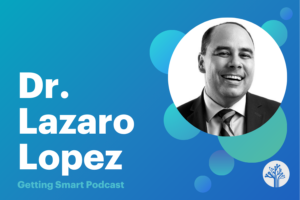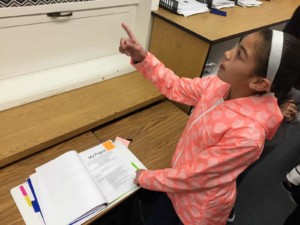Measuring What Matters: A Framework Review

If you want to move the needle on something, you’d better have a needle. In contrast to academic achievement, where we have many wonderful, technically sound instruments, we are way behind in SEL. – Clark McKown, Rush Neurobehavioral Center
Good habits are at least as important as basic skills when it comes to success in college and work. The ability to self-manage, interact successfully, and make good decisions (often called social emotional learning) pays big life dividends. The ability to apply creative know how in new situations is at least as important as historical and technical knowledge.
This post reviews several whole-student outcome frameworks, particularly those that attempt to describe and measure productive dispositions and habits.
NGLC MyWays
Building on David Conley’s work, Next Generation Learning Challenge suggests broader aims that include habits of success and navigational skills. The twenty MyWays competencies provide a framework for next generation learning and reflect current research in education, workforce and human development.

The MyWays Community of Practice is as much about shared mindsets as practices. The mindset shifts involved in design learning, assessment, school operating habits, and community culture around a broader, deeper definition of student success include:
- Honor agency: Educators who have a mindset that honors agency avoid delivering content and products and instead encourage creation and deep engagement, for their students and themselves.
- Hold the whole: Educators who have a mindset that “holds the whole” recognize that human development is interconnected; learning is personal, social, and interdisciplinary; and assessment is a dialogue.
- Invite the community: Educators who have a mindset that invites the community value the insights of students, parents, teachers, and partners about the kind of community they want and the local resources available to help students build it.
- Embrace change: Educators who have a mindset that embraces change focus on continuously adjusting and improving their students’ learning experience to life’s changing realities.
- Risk vulnerability: Educators who have a mindset that risks vulnerability are open to the stumbles, hiccups, and the joys of their own learning and the learning of students.
The MyWays framework suggests a comprehensive approach to assessment including:
- Formative assessment: To provide the essential foundations for effective learning and personal development.
- Performance assessment: To provide the rich context for development and measurement of agency as well as capability.
- Multiple and varied measures: To address the whole learner and the breadth of competencies within next gen learning environments.
- Badges and microcredentials: To integrate “anywhere, anytime learning” within personalized learning approaches,
- Quality reviews: To ensure the quality of the learner experience when outcomes can’t be measured (and even when they can).

GSP Transferable Skills
Great Schools Partnership is building an online system to support the design, implementation and scoring of performance assessment tasks that measure the Transferable Skills which include Communication, Problem Solving, Informed Thinking, Self Direction, and Collaboration, are essential life skills that students should practice across content areas and will need in any form of postgraduate training, study or career.
“We are in the process of working with teachers who are piloting the assessment tasks,” said executive director David Ruff. The project will provide resources to support explicit instruction, train teachers to identify evidence of proficiency, and certify teachers as aligned scorers of student work. There are several sample task on the Vermont Agency of Education site.

CASEL SEL
As more districts and schools introduce social and emotional learning (SEL) strategies CASEL has formed an Assessment Work Group in partnership with California’s CORE Districts, Transforming Education, RAND, and Harvard University. A small sample size CASEL scan identified these outcome frameworks (from most to least frequently mentioned):
- Search Institute’s Developmental Assets
- Partnership for 21st Century Learning Skills
- Transforming Education’s MESH framework
- The Big Five Personality Types framework
- University of Chicago CCSR’s Model of How Five Non-Cognitive Factors Affect Academic Performance (2012)
- Preparing Youth to Thrive Framework from the Weikert Center
- NRC Framework for Non-Cognitive Skills
- The OECD Skills for Social Progress
- University of Chicago CCSR’s Foundations of Young Adult Success framework (2015)
- The KIPP Character Strengths
- Building Blocks For Learning from Turnaround for Children
- The Habits of the Heart framework from Parker Palmer
Below is a comparison of several of the frameworks:
CA CORE SEL
The California CORE school districts serve one million students and have been working collaboratively for six years on a shared data system to boost achievement. CORE districts share a School Quality Improvement Index which includes SEL measures.
- Chronic Absenteeism
- Student/Staff/Parent Culture-Climate Survey
- Suspension/Expulsion Rates
- Social Emotional Skills
- English Learner Re-designation
- Disproportionality in Special Education Identification
CORE districts have prioritized four SEL competencies: growth mindset, self-efficacy, self-management, and social awareness. “These four competencies were selected based on research about the importance, measurability, and actionability of each competency as well as the lived experience of educators within each district.” Because the districts don’t believe this list is comprehensive, they encourage districts to continue exploring other constructs.
Self reported surveys, like the one shown below, are used to capture the experience of students in grades 5-12. (See a case study on Fresno Unified uses self-report surveys.)

The downside to surveys is that you can only administer them once or twice a year, said Noah Bookman, CORE Chief Strategy Officer, “They’re good for system- and school-level diagnoses. But they don’t help classroom teachers try out new strategies. For that you need more frequent direct assessments looking at whether the kids actually developed the skills versus whether they perceive they did.” (For a longer discussion of surveys, see a new McREL post.) In September 2016 Transforming Education published “Expanding the Definition of Student Success: A Case Study of the CORE Districts”—a case study of how social-emotional competencies were prioritized and assessed.
Thrive Public Schools
Thrive Public Schools is a San Diego network with a sophisticated combination of blended, social emotional, and project-based learning. SEL focus collaboration, sharing, thinking critically, exploration, and persistence. Academic tasks at Thrive have embedded opportunities for social and emotional skills demonstrations. On a daily basis, Thrive teachers monitor SEL development with students using this rubric (just the highest level shown).

For more see:
- Innovation, Empowerment and Positive Change in San Diego Schools
- Partnering with Parents on SEL
- Embedding SEL Across the Curriculum
- CASEL: Leading Advocate for Social Emotional Learning
This is an update to a post that originally ran in 2015.







0 Comments
Leave a Comment
Your email address will not be published. All fields are required.